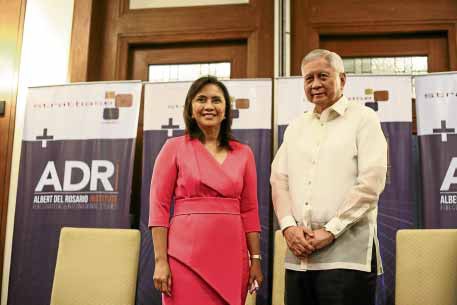
INTERNATIONAL SUPPORT Vice President Leni Robredo and former Foreign Secretary Albert del Rosario call on the Philippines’ allies to help the country enforce an international arbitration court’s ruling against China in the South China Sea disputes. —EARVIN PERIAS
Two years after winning an international arbitral court ruling against China, the Philippines has become a “willing victim” of the Asian behemoth in the South China Sea disputes, former Foreign Secretary Albert del Rosario said on Thursday.
“The Philippines has had two years to take advantage of its position to develop and obtain the support of many countries whose principles are aligned with our own and with whom our own voice could be magnified. Sadly, however, this was not made to happen,” Del Rosario said at a forum organized by the research group Stratbase ADR Institute at Manila Polo Club in Makati City to mark the second anniversary of the ruling.
On July 12, 2016, ruling on a case brought by the Philippines, the Permanent Court of Arbitration in The Hague declared invalid China’s claim to nearly the entire South China Sea.
The UN-backed court pronounced China in violation of the Philippines’ sovereign right to fish and explore for resources in the West Philippine Sea, waters within Manila’s 370-kilometer exclusive economic zone in the strategic waterway.
‘An abettor’
The ruling came two weeks after President Duterte took office. He, however, did not seek UN help to enforce the ruling and instead set it aside in exchange for Chinese aid and investment.
Del Rosario, who led the team that argued the Philippines’ case in the Hague court, said “the government has persisted in allowing China to deprive our citizens of what is ours by continuing to shelve the tribunal outcome.”
“What may we call one that acquiesces to the abuses against it? Answer: a willing victim. What may we call one that defends an aggressor at every opportunity? Answer: an abettor,” he added.
Del Rosario called China a “bully” and a “grand larcenist” for its unlawful activities, including blocking development of the Philippines’ natural resources, destroying the marine environment, and building military bases on Philippine territory in the region.
‘There is still time’
But there is still time to do what is right, the former foreign secretary said, including multilateralism at the United Nations or with the Association of Southeast Asian Nations (Asean) or through bilateral engagements with other states.
“We reiterate our position that coercion has no place in a rules-based international order… As Filipinos, we must voice our sentiments to our government and exercise our right to raise our indignation against China,” he said.
Acting Chief Justice Antonio Carpio, a member of the Philippine team in The Hague and one of the speakers at the forum, called on other countries to press their exercise of the freedom of navigation to enforce the Hague court’s ruling invalidating China’s claim to almost all of the South China Sea.
“With these operations, China can no longer turn the South China Sea into a Chinese mare nostrum (our sea),” Carpio said.
‘Peaceful protest’
Vice President Leni Robredo, speaking at a news forum marking the second anniversary of the arbitral ruling, called on the Philippines’ allies to rise in “peaceful protest” against China’s militarization of the South China Sea.
Diplomats from Japan, Australia, Britain, Singapore, Canada, Switzerland, Germany, United States, Vietnam, Denmark and France and former government officials who were involved in the Hague arbitration attended the forum.
Sen. Francis Pangilinan issued a statement suggesting that the Philippines engage the naval powers and the navies of its Southeast Asian neighbors to enforce the freedom of navigation in the South China Sea.
Detained Sen. Leila de Lima issued a statement saying that since the Duterte administration had chosen to forfeit the Hague award, challenging China’s militarization of the South China Sea had been left to other countries like the United States and its allies in the Asia-Pacific region. —WITH REPORTS FROM LEILA B. SALAVERRIA, JEROME ANING, MELVIN GASCON AND CATHRINE GONZALES